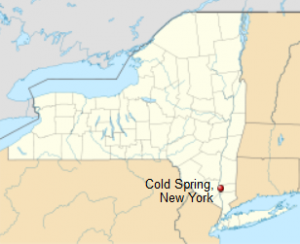An excellent article by Michael Turton came out today in the Philipstown.info. It hit on important preparedness issues for cities in the east – or anywhere, for that matter.

Thanks to Wikipedia for this map.
(In case you aren’t familiar with this part of the country, the Town of Philipstown is in Putnam County, New York. Two incorporated villages lie within the Town. The Village of Cold Spring, focus of Turton’s article, is one of them. It lies across the river from the U.S. Military Academy at West Point.)
If you don’t have time to read the whole article, here are highlights, with my comments. Every single one of these points could be an action item for your group or community!
1. Leadership. Set up a local committee if you don’t have one yet. Turton’s article refers to a specific committee being put together for the Village of Cold Spring. The Mayor and a Trustee sit on the committee, as well as residents.
2. Registry. Find out who in your community needs special care. First Responders need to know who lives where and what special circumstances exist, such as a need for oxygen or wheelchair access. Having this information allows them to check even before a storm hits. The Cold Spring committee is starting with volunteer participation in assembling a resident registry – but the committee is willing to consider a local law if necessary.
3. Local centers. Identify local venues that could serve as temporary respite centers – but not necessarily “shelters.” As reported in the article, a formal “shelter” may require security and medical personnel.
4. Emergency supplies. Put shelter in place as first priority, evacuation as second. Of course, shelter in place requires that people have survival kits for the first 72 hours, enough to get them home safely. And then, at home, they need more emergency supplies to carry them through.
5. Priorities. Set guidelines for the distribution of community resources: sandbags, medical supplies, pumps, fuel supplies, etc. Who gets first access?
6. Gawkers. Educate the community about the dangers of gawkers. (Aside from Virginia Nicols – This is a tough one! We’ve had neighbors get all in a huff when our local team kept them from driving right up to the site of a fire, impeding the fire department and hindering rescue efforts!)
7. Authority. Make sure people know HOW to turn off community utilities (gas, lights, etc.) and that the turn-off switches work in all conditions. (Another aside from Virginia: Authority to turn off community systems – such as natural gas distribution systems — needs to be limited, and those people need to be properly trained.)
Here in the west, more groups are forming this month to do precisely what the Village of Cold Spring has begun. What’s going on in YOUR community? Let us know by sending a comment.
Virginia
Your Emergency Plan Guide Team
Don't miss a single Advisory.
Thank you for subscribing.
Something went wrong.
